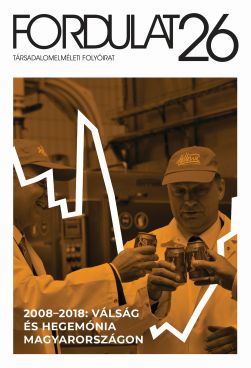Dinamikus hatalom. Kulturális termelés és politika Magyarországon 2010 után
Dynamic Power. Cultural Production and Policy in Hungary after 2010
Author(s): Emília Barna, Mária Madár, Kristóf Nagy, Márton SzarvasSubject(s): Fine Arts / Performing Arts, Cultural history, Supranational / Global Economy, Economic history, Social history, Sociology of Culture, Transformation Period (1990 - 2010), Present Times (2010 - today), Socio-Economic Research, Politics of History/Memory, Politics and Identity
Published by: Fordulat
Keywords: culture;cultural production;cultural policy;cultural politics;state formation;popular music;public work;ideology;Orbán-regime;Orban regime;culture in Hungary;cultural politics in Hungary;hegemony
Summary/Abstract: Interpreting cultural production from the perspective of political economy,Interpreting cultural production from the perspective of political economy, the paper seeks to define the material conditions of the creation and production of culture, and the social processes and structures that determine the positions of producers of culture after 2010. We analyse changes in cultural production through three areas. First, we look at the role of cultural public work in state cultural production. Then we analyse the relation between the state and the market through changes in the financing of popular music. Finally, we look at ideology production and the establishment of state hegemonic strategies through the historical changes affecting newly founded (such as the Hungarian Academy of Arts, the Hungarian National Film Fund and the Hangfoglaló Programme) or transformed institutions (such as the Public Foundation for the Research of Central and East European History and Society or the Petőfi Museum of Literature).In these areas, the characteristics of state cultural policy after 2010, the interests of local and global market actors, and the transformation of the employment of cultural producers (incorporation and expulsion) are simultaneously present, making them suitable illustrations for the logic of cultural production and the changes and haphazard nature of cultural policy under the Orbán regime. The main goal of the analysis is shedding light on the complexity of the mechanism of hegemony, as well as the interests of, and damages suffered by, social groups in similar positions, and recognising the possibilities of action that follow from these. We suggest looking upon the downfall of the old hegemon and the incompleteness of the new one as an opportunity, as opposed to a reason for mourning over the loss of values, since it is such transitory moments that reveal the real nature of constructed social practices.
Journal: Fordulat (2008-tól Új Folyam)
- Issue Year: 2019
- Issue No: 26
- Page Range: 225-251
- Page Count: 27
- Language: Hungarian

